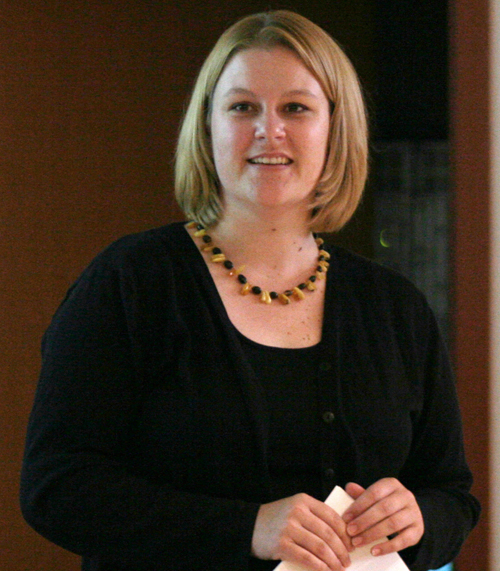 High praise of Wabash professors by their students has long boosted the College’s high rankings in national surveys, including Forbes Magazine’s recent naming of Wabash as the 12th best college in the nation.
High praise of Wabash professors by their students has long boosted the College’s high rankings in national surveys, including Forbes Magazine’s recent naming of Wabash as the 12th best college in the nation.
If the record number and enthusiasm of professors presenting their work at Friday's Ides of August is any indicator, students are in for more of the same as they return to Wabash this week. Click here and here for photo albums.
Twenty professors from practically every discipline at the College taught their first classes of the new semester with their faculty colleagues as students. Subjects ranged from ion traps and harmonic oscillators to the emergence of wage discrimination in U.S. manufacturing to causality in psychological research to violence, genocide, and what it means to read the Bible responsibly.
And while the focus of Ides is on faculty research, several presentations underlined the symbiotic relationship between scholarly research and teaching at this liberal arts college.
Take Professor of Theater Michael Abbott’s discussion of his web site blog and international discussion forum on narrative video games: Abbott, a past winner of the College's highest award for teaching, began investigating such groups after the first year he taught the freshman tutorial, The Art and History of Electronic Gaming. The tutorials are designed to engage freshman in topics they care about while teaching them the skills to research, think through, and articulate their findings.
"In that class, I encountered the most impassioned and thoughtful discussions, the best examples of creative and critical thinking, and the finest papers I’ve read in all my years teaching," Abbott told his fellow professors. He interviewed educators such as Professor James Gee, author of the 2003 book What Video Games Have to Teach us About Learning and Literacy, who told Abbott that "21st century learning must be about understanding complex systems" and introduced him to the phrase "passion communities."
Abbott’s blogsite The Brainy Gamer has become such a community, with more than 460,000 hits since he started it in August 2007. Abbott said the way members of that community respectfully and knowledgeably discuss even the most controversial issues could be a model not only for how Wabash students interact in virtual communities, but in face-to-face learning communities, as well.
Abbott’s was the first of 20 presentations at the day-long event, which was established 24 years ago by Professor of Biology Tom Cole ’58 to update or introduce faculty to their colleagues’ scholarly work.
In photo: Visiting Professor of Art Kristen Wilkins